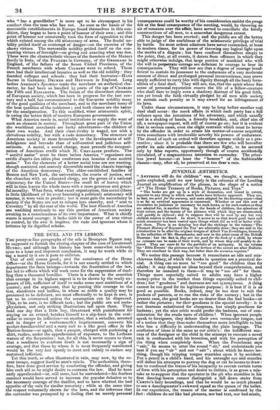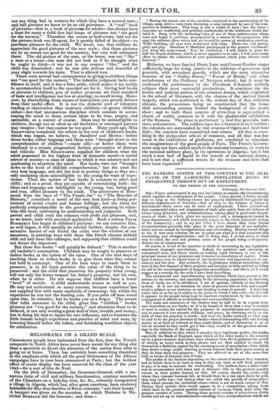JUVENILE 'ESTHETICS.
" Aril-rum° will do for children" was, we thought, a sentiment quite exploded, until we saw lately in the columns of the Leading Journal an amplification of the phrase, in the shape of a notice of" The Home Treasury of Books, Pictures, and Toys."
"The books are got up in a style of decoration, and bound in covers, superior to any thing in which such books have hitherto appeared. They are, in fact, too good for the nursery, and more adapted for the drawing-room—that is as far as external appearance is concerned. Whether or not this sort of decoration be judicious or necessary for such books, or for such readers as they are adapted for, is another thing. In the hands of children, the splendour of their covers, and the beauty of the pictures with which they are ornamented, will quickly be defaced; and to suppose they will be read by any but very childish readers is absurd. In short, it seems to us that much good taste and much ornament has been wasted upon things which did as well or better with- out them. There is no denying but that the etchings in the volume The Pleasant History of Reynard the Fox' are admirably done : they are said in the introduction to be after the original designs of Albert Van Everdingen, formerly in the collection of Mr. Sheepshanks, and now in the print-room of the British Museum : but the fact is, they are too good for the book of a child, by whom no estimate can be made of their worth, and by whom they will quickly be de- faced. They are more fit for the portfolio of an antiquary. In the volume the Bible Events' the pictures and the devices of the covers are after Holbein. They are excellent in their way, but better than the occasion requires."
We notice this passage because it resuscitates an idle and mis- chievous fallacy, of which the books in question are a practical de- nial. A thing can no more be "too good" for children than for adults : it may depend on ideas beyond their comprehension, and therefore be unsuited to them—it may be "too old" for them. Things more especially suited to adults may have a higher money-price in the market than things especially suited to chil- dren; but " goodness " and dearness are not synonymous. A thing cannot be too good for its legitimate purpose ; it is best if it is as good as possible. Books, indeed, may be too dear to suit the pockets of parents, or to run the risks of the nursery ; but in the present case, the good books are no dearer than the bad books—or rather the pictures ; for their goodness is the special novelty : it is not dearness substituted for cheapness, but simply goodness for badness ; yet the nice critic would prefer the badness, out of con- sideration for the crude taste of children! When ignorant people speak to foreigners, they debase their own vernacular tongue, out of a notion that they thus make themselves more intelligible to him who has a difficulty in understanding the plain language. The confusion of ideas is the same as our critic's : the indifferent suc- cess of the foreigner or the child in the attempt to execute a novel task is confounded with his intention, and with his perception of the thing when completely done. When the Frenchman says " sair " he means to utter the sound " sir " and understands you best if you say "sir" and not " sair "; about which he knows no- thing, though his tripping tongue stumbles upon it by accident. Put a pencil in a child's band, and his untaught eye and muscles will defeat his attempts to portray the dog or cat he means to draw : but to confound the traces of his incapacity to execute certain turns of form with his perception and desire to imitate, is as gross a mis- take as to suppose that the spectator in the pit who stumbles in his first dancing-lesson cannot distinguish a fall down stairs from CERITO'S fairy boundings, and that he would be as much pleased to see a dancingmaster's awkward squad as the queen of the ballet. In our experience, the reason of the matter is confirmed by the fact : children do not like bad pictures, nor bad text, nor bad music,
nor any thing bad in matters for which they have a natural taste ; and bad pictures we know to be an old grievance. A "real" book of pictures—that is, a book of pictures for adults—has always been a feast for many a child that had heaps of pictures not "too good for the nursery." Therefore the crown or half-crown laid out for the picture-book was ill-spent, for it greatly failed of its object—to purchase pleasure for the child. We know, too, that children do appreciate the good pictures of the new style ; that those pictures are by no means too good for the nursery, but very well estimated there. The old picture of the man, or the horse, was not " like " a man or a horse—the man did not look as if he thought what he ought to think—it was not in any respect "like," and the child was dissatisfied ; and he was also jealous and resentful of your slight towards his taste. That is altered now.
There were several bad consequences in giving to children things not "too good for the nursery." The infantile judgment lacks con- fidence in itself, and it has a false pride, which makes it try tacitly to accommodate itself to the standard set for it. Giving bad books or pictures to children, you of malice prepense set their standard of taste and intelligence too low at starting; no small wrong. More- over, by discrediting those means of instruction, you greatly detract from their useful effect. It is not the didactic part of voluntary reading or observation that instructs children—or grown children either—but that unconscious discipline which consists in accus- toming the mind to deem certain ideas to be true, proper, and estimable, as a matter of course. Ideas may be unintelligible to children, though not so often as old bachelors or estranged parents may imagine ; but they cannot be too good. Many years ago, Miss EDGEWORTH completed the reform in the text of children's books, which was begun, we believe, by Sandford and Merton: before those books, either language and ideas were "brought down to the comprehension of children "—made silly—or better ideas were idealized in a certain pragmatical fashion provocative of distrust and ridicule. Miss EDGEWORTH supplied for children what the adult possessed in the highest kind of domestic novel—a useful mirror of society—a class of ideas to which it was salutary and not unpleasing to accustom the mind. Her books were not "brought down to the level of childish comprehension," but she used the very best language, and did her best to portray things as they are ; only excluding ideas unintelligible to the young for want of expe- rience. Thus the matter of her books is common to adult and child; and as a proof, they are capable of entertaining both : the ideas and language are intelligible to the young, but, being good and true, afford pleasure to the adult. The adventures of Rosa- mond, from the days of "The Purple Jar" to "The Bracelet of Memory," constitute a novel of the very best kind—a living por- traiture of social events and human feelings ; but the ideas are perfectly comprehensible to the growing child, amusing its other- wise idle hour, cultivating its understanding and judgment. Both parent and child read the volumes with profit and pleasure, and, as we know, both with practical application. Such a reform FELrx SITAIMERLY has begun in children's pictures : we can conceive that, so well begun, it will speedily be carried further, despite the con- servative lament of our friend the critic over the wisdom of our ancestors, in painting boys with faces like Dutch cheeses dabbed With red and trees like cabbages, and supposing that children could not detect the imposture.
But these fine books " will quickly be defaced." This is another old bachelor's assumption. Children may be taught to preserve or deface books, at the option of the tutor. One of the best ways of teaching them to deface books is to give them what they cannot but hold in contempt. One of the best ways to teach them to preserve, is to let them perceive the value of the thing to be preserved : and the child that preserves his property when young, will not only the better respect his father's property, but his own, when he is older. Do not suppose that children have a lower "level" of morals. A child understands reason as well as you. He may not understand so many reasons, because experience has not supplied him with many materials of reasoning ; but within his experience be can test the sterling coin. If you palm off base metal upon him, he submits ; but he books you as a forger. The parent that talks nonsense to his child, gives him " childish " books, pictures not "too good for the nursery," and abandons them to be defaced, is not only wasting a great deal of time, trouble, and money, but is doing his best to injure his own influence, and to frustrate the little human being's experience and practice of mind and taste, by lowering himself before the infant, and furnishing worthless objects for admiration.



























 Previous page
Previous page